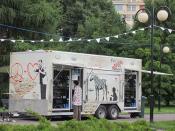"Revolutionary Government resorted to extreme measures to consolidate power." How valid is this statement?
The Bolshevik take over of October 1917 was achieved with speed and little bloodshed; however, the new government was far from secure. The Bolsheviks controlled little except Petrograd and many thought that they would struggle to hang on to power. Many people were against the Bolsheviks "The insane attempt of the Bolsheviks is on the eve of collapseâ¦the Bolsheviks are alone" (soldier section of SR party, October 1917)1 . One Socialist Revolutionary leader gave it 'no more than a few days', while the Menshevik leader, Tsereteli, gave it three weeks2. This dire situation forced the Bolsheviks to resort to extreme measures like shut down the Constituent Assembly, signing the Treaty of Brest-Litovsk, the use of terror and then 1917 land decree.
Lenin had promised to the people that a new parliament, the Constituent Assembly, was to be elected.
One of the dearest dreams of the Russian people was to have a government in which they would elect and would represent their interests. This was not one of Lenin's dreams. In Lenin's eyes, the Constituent Assembly posed a real threat to his socialist vision. He believed it to be a real threat because what if the elections were held and the Bolsheviks did not receive the majority of votes? On the other hand, if he didn't let the elections take place, how could he claim he represented the interests of the people of Russia like they always wanted? The results of the elections are below,
% of the votes
Socialist Revolutionaries 40.4
Bolsheviks 23.2
Other Socialists 15.0
National Parties 7.7
Kadets 4.6
Mensheviks 2.9
Cossacks 2.2
Figure 1: Election results for the Constituent Assembly3, taken from Oxley, Russia: From Tsars to Commissars, page 115...


